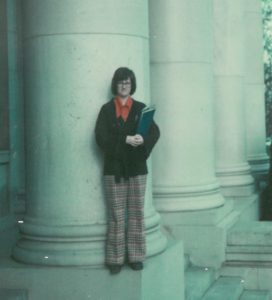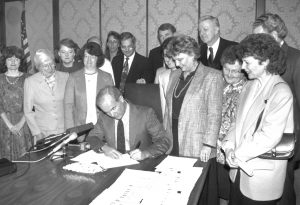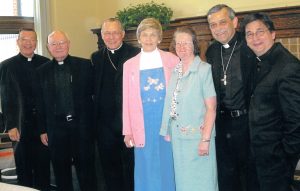Sister Spotlight – Sharon Park, OP




“I think the Dominican charism is embedded in us in how we live and who we know, and it’s just carried out.” Those are the words of Sister Sharon Park, OP, who carried out the Dominican Charism from hospitals and a community college to the halls of the Capitol in Olympia, Washington.
Sister Sharon didn’t start out as an Adrian Dominican Sister. She attended Bishop Blanchet High and was taught by members of 10 congregations, including the Edmonds Dominican Sisters. She entered the Edmonds Dominican Congregation, which ultimately merged with the Adrian Dominicans in 2003.
After years in her chosen ministry – nursing, in a variety of settings – Sister Sharon embarked on an unusual ministry that involved 40 years of her life: advocacy with the state legislature of Washington on behalf of the common good.
While serving as a public health nurse – visiting and caring for patients, largely senior citizens, in their homes – Sister Sharon became aware of the injustices that senior citizens and people living in poverty face. “They make choices between medicine or food,” she observed. “There’s an injustice there.”
As a member of the Social Justice Committee of the Archdiocesan Sisters Council in Seattle, she took part in a six-month process in which she learned about the workings of the state legislature in Olympia. She and Sister Margaret Casey were chosen in 1977 as the first lobbyists for the Washington State Catholic Conference, begun under Archbishop Raymond G. Hunthausen of Seattle, to support public policies in the state legislature that promote the common good.
Sister Sharon served as Associate Director for 20 years, leaving for a few years to work toward her master’s degree in theology with a concentration in bioethics from Seattle University. She returned to the WSCC and, in 1997, was appointed Executive Director, a position she held until her retirement in 2017. She later served the Archdiocese of Seattle as Vicar for Religious.
Much of Sister Sharon’s ministry involved lobbying for or against bills that would affect the common good. She often met with Catholic school superintendents, representatives of the Catholic Charities agencies in Washington, or other Catholic entities to discover how a particular bill would affect their work and the people they served. This is the beginning of a long process of lobbying for a bill: finding a sponsor for the bill, shepherding it through a committee; and lobbying for the bill to be passed in the House and the Senate and eventually signed by the governor.
“We lobbied for every entity the Church had,” Sister Sharon said. “Schools were a major issue. We worked with ecumenical issues … and life issues.” In addition, she said, they lobbied for social services for the aging, for the environment, programming for children, children’s and family services, and jail ministry.
Sister Sharon emphasized the need for lobbyists to negotiate as much as possible for bills that would uphold the common good, knowing that the bill might not contain all the elements that the lobbyists hope for. “You get as much as you can at this time, and you know at the next session, you’ll try to get the rest.”
At the same time, Sister Sharon emphasized, “You don’t compromise the principles, but you can negotiate around the edges. We don’t give up who we are: Catholic Christians who stand up to the truth as we know it, but you also have to listen to what other people say.”
Sister Sharon’s ministry also involved working on pastoral letters and documents. She was particularly pleased with the 2001 pastoral letter, The Columbia River Watershed: Caring for Creation and the Common Good by the Catholic Bishops of the Pacific Northwest. She was involved in the listening sessions that guided the bishops in writing the letter.
“The Columbia River starts in British Columbia,” she said. For three years, she said, “we went to all the states and British Columbia, all the entities that touched the Columbia River: farmers, governments, people who fished the river. We met with all of those groups and we just listened.”
Sister Sharon had the unique opportunity to hear how an individual was personally affected by another document she helped to develop: the WSCC’s document on the Living Will and the Power of Attorney. She spoke at parishes and other Catholic organizations to explain the Church’s teaching on end-of-life issues. “One woman came to me and said, ‘This is the most helpful thing that has happened to me,’” Sister Sharon recalled. The document eased her mind and conscience about taking her husband off life support when he was dying.
While serving formally as an advocate, Sister Sharon also had a positive impact on the people she worked with in the state capitol. Upon her retirement, a House Resolution proclaimed, “Legislators and lobbyists often describe her as an intelligent, thoughtful, and caring member of the Capitol community, who would also be an effective negotiator on some of the most difficult issues facing policymakers.”
Sister Sharon is now formally retired and living at the Motherhouse in Adrian. Still, she said, “I’ve been involved as much lately as when I had a full-time job.” She serves on 10 committees: four in the Archdiocese of Seattle and six in Adrian.
 USA
USA


